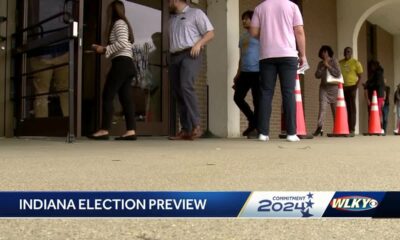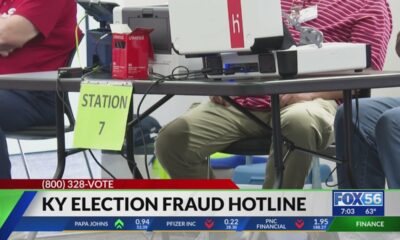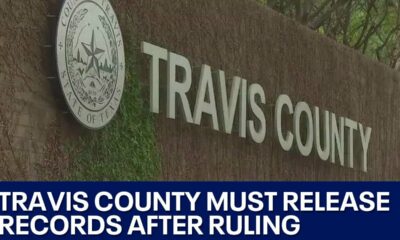Mississippi News
5th Circuit upholds Jim Crow-era law to keep Black Mississippians from voting
5th Circuit upholds Jim Crow-era law written to keep Black Mississippians from voting
Editor’s note: This story contains graphic language.
The U.S. Fifth Circuit Court of Appeals has affirmed a lower court ruling allowing a provision of the 1890 Mississippi Constitution designed to keep African Americans from voting to remain in place.
The provision places a lifetime ban on voting in most instances on people convicted of certain felonies — crimes that the framers of the 1890 state Constitution said Black Mississippians were more prone to commit.
The framers did not disenfranchise people convicted of murder or rape, for instance, but did strip voting rights of people convicted of several “lesser crimes,” which the writers of the Constitution falsely believed would be committed by African Americans.
The “per curiam” or unsigned opinion of the 5th Circuit said because of actions taken by the Legislature in the 1950s and 1960s allowing voters a chance to amend the constitutional provision, among other things adding murder and rape as disenfranchising crimes, the provision no longer has a racist taint.
“Plaintiffs have not demonstrated that Section 241 as it currently stands was motivated by discriminatory intent or that any other approach to demonstrating the provision’s unconstitutionality is viable,” the majority said.
The majority opinion also cited the Legislature taking up the issue in the 1980s and opting not to change it.
The provision was defended on behalf of the state by the office of Attorney General Lynn Fitch.
The Mississippi Center for Justice among other groups brought the lawsuit on behalf of two Black Mississippians who had lost the right to vote: Roy Harness and Kamal Karriem, convicted of forgery and embezzlement, respectively.
“This provision was a part of the 1890 plan to take the vote away from Black people who had attained it in the wake of the Civil War,” said Rob McDuff, director of the Impact Litigation Project at the Mississippi Center for Justice. “Unfortunately, the Court of Appeals is allowing it to remain in place despite its racist origins. Despite this setback, we will continue this battle and seek review in the U.S. Supreme Court.”
The case was considered by 17 members of the U.S. 5th Circuit Court of Appeals, considered one of the most conservative judiciaries in the nation. Oral arguments were held in the case in September 2021 in New Orleans.
In a statement, Fitch’s office said, “We are pleased with the court’s decision. As the court noted, ‘Plaintiffs’ proposal that a state constitutional amendment must be voted on word for word to avoid any vestigial racial taint is radically prescriptive…. No subsequent case law supports plaintiffs’ novel, judicially crafted political theory of public consent.'”
”Seven of the 17 members dissented with the majority opinion. Circuit Judge James Graves Jr., previously a member of the Mississippi Supreme Court, wrote a lengthy dissent detailing the state’s sordid racist past, including events from the 1960s when the Legislature allowed the electorate to vote on the constitutional provision. That vote allowed murder and rape to be added as disenfranchising crimes, but did not give the electorate the opportunity to vote on whether other changes needed to be made to the provision or whether the entire Jim Crow provision should be stricken from the Constitution.
As part of Graves’ history of the state’s racial past, he cited progress that led to the election of Black officials — including him as a judge — and led to the replacement of the old Mississippi state flag that contained the Confederate battle emblem as part of its design.
Citing that the state had not been allowed to vote on the provision, Graves wrote: “Mississippians have simply not been given the chance to right the wrongs of its racist origins. And this court … deprives Mississippians of this opportunity by upholding an unconstitutional law enacted for the purpose of discriminating against Black Mississippians on the basis of race.”
In his opening, Graves quoted segregationist former Mississippi Gov. James K. Vardaman.
“There is no use to equivocate or lie about the matter … Mississippi’s constitutional convention of 1890 was held for no other purpose than to eliminate the nigger from politics … In Mississippi we have in our Constitution legislated against the racial peculiarities of the Negro … When that device fails, we will resort to something else.”
In Mississippi, people with felony convictions must petition the Legislature to get a bill passed by a two-thirds majority of both chambers to regain voting rights. Normally only a handful (less than five) of such bills are successful each session. There is also the option of the governor granting a pardon to restore voting rights, but no governor has granted pardons since Haley Barbour in 2012.
For a subset of those who lose their rights, the courts can expunge their record. In some instances that expungement includes the restoration of voting rights, while for others it does not. That outcome depends on the preference of the judge granting the expungement.
Those crimes placed in the Constitution where conviction costs a person the right to vote are bribery, theft, arson, obtaining money or goods under false pretense, perjury, forgery, embezzlement, bigamy and burglary.
Under the original language of the Constitution, a person could be convicted of cattle rustling and lose the right to vote, but those convicted of murder or rape would still be able to vote — even while incarcerated.
This article first appeared on Mississippi Today and is republished here under a Creative Commons license.
Mississippi News
Events happening this weekend in Mississippi: April 25-27
SUMMARY: This weekend in Mississippi (April 25-27) features a variety of events across Central and Pine Belt regions. Highlights include MiraGotSoul at Vibe Studio in Jackson, a community Dinner and Movie in Clinton, and the Natchez Kite Festival. Enjoy live performances with Sweet Lizzy Project in Natchez and the New Bourbon Street Jazz Band in Clinton. Family-friendly activities include the Native Plant Fest and Community Farmers Market in Jackson. In Hattiesburg, catch the Henry Cho tour and the Downtown Crawfish Jam Music Festival. Overall, it’s a weekend full of entertainment, culture, and fun activities for all ages.
The post Events happening this weekend in Mississippi: April 25-27 appeared first on www.wjtv.com
Mississippi News
Events happening this weekend in Mississippi: April 18-20
SUMMARY: This weekend (April 18-20), Mississippi offers a variety of events for all ages. In Jackson, enjoy Food Truck Friday, a jazz concert, free outdoor movie screenings, and multiple exhibitions including “Of Salt and Spirit” and “Hurricane Katrina: Mississippi Remembers.” For family fun, there’s an Easter Egg Hunt at the Ag Museum and “Bunnies & Butterflies” at MCM. Natchez features the Spring Pilgrimage, Lafayette’s 200th anniversary celebration, and a farmers market. In the Pine Belt, highlights include Live at Five, a Spring Candle-Making Workshop, and Easter events at the Hattiesburg Zoo. Don’t miss the Bluff City Block Party and more!
The post Events happening this weekend in Mississippi: April 18-20 appeared first on www.wjtv.com
Mississippi News
Events happening this weekend in Mississippi: April 11-13
SUMMARY: This weekend in Mississippi (April 11-13), enjoy a variety of events across the state. Highlights include the Eudora Welty Birthday Bash in Jackson, Trivia Night at the Mississippi Museum of Natural Science, and Boots & Bling Fundraiser in Natchez. For family fun, check out the Bunny Bonanza in Jackson or the Easter Egg Hunt in Clinton. The Natchez Concours d’Elegance Car Show and Stranger Than Fiction Film Festival offer cultural experiences, while the 12th Annual Dragon Boat Regatta in Ridgeland and the Hub City Classic Car Show in Hattiesburg provide exciting activities for all ages.
The post Events happening this weekend in Mississippi: April 11-13 appeared first on www.wjtv.com
-

 News from the South - Florida News Feed7 days ago
News from the South - Florida News Feed7 days agoJim talks with Rep. Robert Andrade about his investigation into the Hope Florida Foundation
-

 News from the South - Florida News Feed5 days ago
News from the South - Florida News Feed5 days agoTrump touts manufacturing while undercutting state efforts to help factories
-

 News from the South - Alabama News Feed5 days ago
News from the South - Alabama News Feed5 days agoPrayer Vigil Held for Ronald Dumas Jr., Family Continues to Pray for His Return | April 21, 2025 | N
-

 Mississippi Today6 days ago
Mississippi Today6 days ago‘Trainwreck on the horizon’: The costly pains of Mississippi’s small water and sewer systems
-

 News from the South - Texas News Feed6 days ago
News from the South - Texas News Feed6 days agoMeteorologist Chita Craft is tracking a Severe Thunderstorm Warning that's in effect now
-

 News from the South - Arkansas News Feed7 days ago
News from the South - Arkansas News Feed7 days agoAs country grows more polarized, America needs unity, the ‘Oklahoma Standard,’ Bill Clinton says
-

 News from the South - Virginia News Feed6 days ago
News from the South - Virginia News Feed6 days agoTaking video of military bases using drones could be outlawed | Virginia
-

 News from the South - Missouri News Feed1 day ago
News from the South - Missouri News Feed1 day agoMissouri lawmakers on the cusp of legalizing housing discrimination




















































